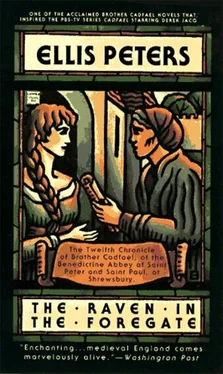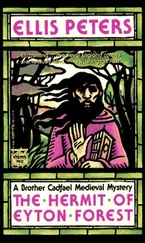“In darkness,” said Cadfael, “any man may step too near a sloping edge and misjudge his footing where a bank overhangs water. But whatever his reason for going along that path, why should he persist beyond the last dwelling? But this broken head I do not believe he got by any natural fall, and he got it before he went into the water. Some other hand, some other person, was there with him, and party to this death.”
“There is nothing in the wound, no fragment to show what manner of weapon it was that struck him?” ventured Brother Edmund, who had worked with Brother Cadfael in similar cases, and found good reason to require his judgement even in the minutest details. But he did not sound hopeful.
“How could there be?” said Cadfael simply. “He was lain in the water all through the night, everything about him is bleached and sodden. If there had ever been soil or grass in his grazes, it would have soaked away long ago. But I do not think there was. He cannot alone have staggered far after that blow was struck, and he was just past the tail-race, or it would have drifted him the opposing way. Nor would anyone have carried or dragged him far if he was stunned, he being a big, heavy man, and the blow being only briefly disabling, not killing. Not ten paces from where we found him, I judge, he went into the pool. And close by that same stretch he got this blow. On top of all, there he was on grass unrutted by wheels, being past the mill-only rough and tufted, as winter turf is. If he had slipped and fallen, the ground there might have half-stunned him, but it would not have broken his head and fetched blood. I have told you all I can tell from this poor body,” he said wearily. “Make what you can of it.”
“Murder!” said Prior Robert, rigid with indignation and horror. “Murder is what I make of it. Father Abbot, what is now to be done?”
Radulfus brooded for some minutes over the indifferent corpse which had been Father Ailnoth, and never before so still and quiet, so tolerant of the views of others. Then he said, with measured regret: “I am afraid, Robert, we have no choice but to inform the lord sheriffs deputy, since Hugh Beringar himself is elsewhere about his own duties.” And with his eyes still upon the livid face on the stone slab he said, with bleak wonder: “I knew he had not made himself loved. I had not realised that in so short a time he could make himself so hated.”
YOUNG ALAN HERBARD, WHO WAS HUGH’S DEPUTY in his absence, came down hot-foot from the castle with the most experienced of his sergeants, William Warden, and two other officers in his train. Even if Herbard had not been well acquainted with the Foregate and its people, Will Warden certainly was, and went in no misapprehension concerning the degree of love the congregation of Holy Cross had for its new priest.
“There’ll be very little mourning for him hereabouts,” he said bluntly, viewing the dead man without emotion. “He made a thorough job of turning every soul in the parish against him. A poor end, though, for any man. A poor, cold end!”
They examined the head wound, noted the account rendered by every man who had taken part in the search, and listened to the careful opinions put forward by Brother Edmund and Brother Cadfael, and to everything Dame Diota had to say of her master’s evening departure, and the anxious night she had spent worrying about his failure to return.
She had refused to depart, and waited all this time to repeat her story, which she did with a drained but steady composure, now that the matter and the mystery were out of her hands. Benet was beside her, attentive and solicitous, a very sombre Benet, with creased brows and hazel eyes clouded by something between anxiety on her account and sheer puzzlement on his own.
“If you’ll give me leave,” said the boy, as soon as the officers had withdrawn from the precinct to go in search of the provost of the Foregate, who knew his people as well as any man could, “I’ll take my aunt back to the house now, and see her settled with a good fire. She needs to rest.” And he added, appealing to Cadfael: “I won’t stay long. I may be wanted here.”
“Stay as long as is needful,” said Cadfael readily. “I’ll answer for you if there should be any questions. But what could you have to tell? I know you were in the church well before Matins began.” And knew, moreover, where the boy had been later on, and probably not alone, but he said nothing about that. “Has anything been said about making provision for Mistress Hammet’s future? This leaves her very solitary, but for you, and still almost a stranger here. But I’m sure Abbot Radulfus will see to it she’s not left friendless.”
“He came himself to speak to her,” said Benet, a faint flush and gleam of his usual brightness appearing for a moment, in appreciation of such considerate usage. “He says she need not be troubled at all, for she came here in good faith to serve the church in her proper station, and the church will see to it that she is provided for. Dwell in the house and care for it, he said, until a new priest is preferred to the benefice, and then we’ll see. But in no case shall she be cast away.”
“Good! Then you and she can rest with easy minds. Terrible this may be, but it’s no fault of yours or hers, and you should not brood on it.” They were both looking at him then with still, shocked faces that expressed nothing of grief or reassurance, but only stunned acceptance. “Stay and sleep there, if you see fit,” he said to Benet. “She may be glad of having you close by, tonight.”
Benet said neither yes nor no to that, nor did the woman. They went out silently from the ante-room of the gatehouse, where they had sat out the long uncertainty of the morning together, and crossing the wide highway of the Foregate, vanished into the narrow mouth of the alley opposite, still silvered with hoar-frost between its enclosing walls.
Cadfael felt no great surprise when Benet was back within the hour, instead of taking advantage of the permission to absent himself overnight. He came looking for Cadfael in the garden, and found him, for once, virtually idle in his workshop, sitting by the glowing brazier. The boy sat down silently beside him, and heaved a glum sigh.
“Agreed!” said Cadfael, stirring out of his thoughts at the sound. “We’re none of us quite ourselves today, small wonder. But no need for you to rack your conscience, surely. Have you left your aunt all alone?”
“No,” said Benet. “There’s a neighbour with her, though I doubt if she’s all that glad of the kind attention. There’ll be more of them, I daresay, before long, bursting with curiosity and worming the whole story out of her. Not for grief, either, to judge by the one I left with her. They’ll be chattering like starlings all over the parish, and never stop until night falls.”
“They’ll stop fast enough, you’ll find,” said Cadfael drily, “as soon as Alan Herbard or one of his sergeants puts a word in. Let one officer show his face, and silence will fall. There’s not a soul in the Foregate will own to knowing anything about anything once the questions begin.”
Benet shifted uneasily on the wooden bench, as though his bones rather than his conscience felt uncomfortable. “I never understood that he was quite so blackly disliked. Do you truly think they’ll hang together so close, and never betray even if they know who brought him to his death?”
“Yes, I do think it. For there’s hardly a soul but will feel it might as easily have been his own act, but for God’s grace. But it need not fret you, one way or the other. Unless it was you who broke his head?” said Cadfael mildly. “Was it?”
“No,” said Benet as simply, staring down into his linked hands; and the next moment looked up with sharp curiosity: “But what makes you so sure of it?”
Читать дальше












